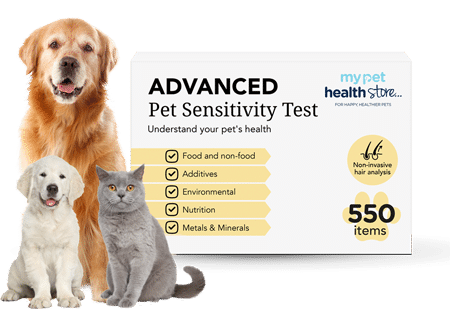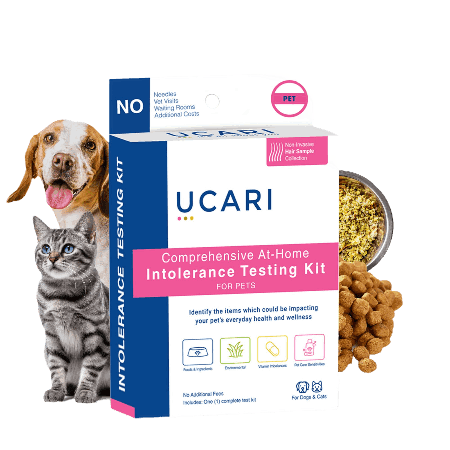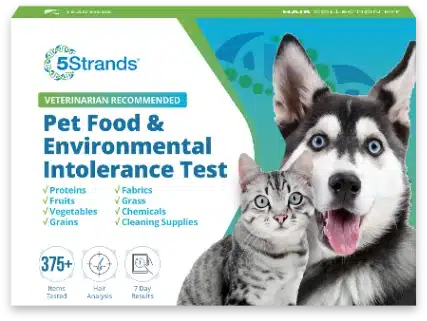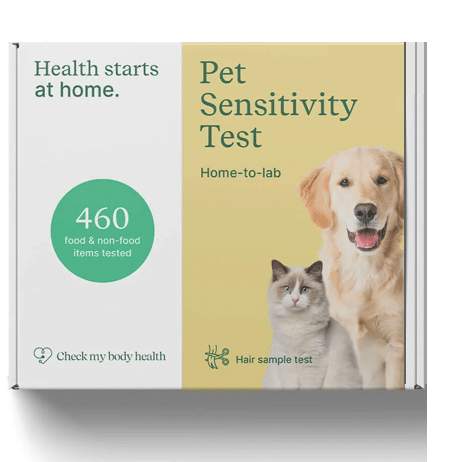
Reviewed by Dr. Joseph Menicucci, DVM, MBA. Veterinary Health Specialist and Diagnostic Expert.
This content is for informational purposes and is not a substitute for professional veterinary advice.
If your pet shows any symptoms mentioned, promptly consult a veterinarian.
Understanding Your Dog’s Silent Cues:
The First Step to Relief
As dog lovers, we view our pets as cherished family members,
relying on us to interpret their signs of distress since they cannot
voice their discomforts.
Recognizing the symptoms of sensitivities and intolerances is crucial for any pet parent aiming to support their furry friend’s well-being. This article explores 8 most common signs of dog sensitivities, often triggered by prevalent elements in their diet and environment, such as specific proteins (chicken, beef), grains (wheat), and environmental factors (trees, grass, dust). Given the ubiquity of these triggers, nearly every dog is at risk of developing sensitivities.
Understanding and acknowledging this reality is the first step towards proactive management, ensuring a happier, healthier life for our canine companions.
From Spotting Signs to Finding Fixes: Immediate Steps for Your Dog’s Comfort.
Identifying initial symptoms, ranging from dermatological discomforts to digestive dilemmas, is crucial in tackling your dog’s sensitivities. Seeking veterinary advice and exploring sensitivity tests can uncover the root causes and provide much-needed relief. The forthcoming section of our guide delves into these tests, charting a course towards a more joyful and well life for your furry companion.
Simplified Dog Sensitivity & Intolerance Detection Test Kits Comparison Chart
← Swipe to Compare →
| Feature |

|

|

|

|

|
|---|---|---|---|---|---|
| Food Sensitivities ⓘ | 283 ingredients | 350+ | 103 ingredients | 275 ingredients | 236 ingredients |
| Environmental Allergens ⓘ | 127 items | 300+ items | 11 items | 105 items | 107 items |
| Non-Food Items ⓘ | 81 | 500+ | 12 | 105 | 58 |
| Test Focus ⓘ | Common Allergens | Extensive Intolerances | Food & Environmental | Food & Environmental | Broad Spectrum |
| Unique Feature ⓘ | Specialized in Common Allergens | Largest Number of Tests | Customized Food Recommendations | Nutritional Analysis | Combined Food & Non-Food Testing |
8 Most Common Dog Sensitivity & Intolerance Symptoms
1. Itchy Skin (Pruritus)
Dogs with food or environmental sensitivities often experience relentless itching. This discomfort can lead to excessive scratching, biting, or licking, particularly around the ears, paws, belly, and rear. Itchy skin can escalate to more severe conditions, such as infections or hot spots, if not addressed promptly.
2. Digestive Troubles
Sensitivities or intolerances to certain food ingredients can manifest as various digestive issues. Symptoms include vomiting, diarrhea, excessive gas, and even changes in appetite. These signs can indicate that your dog’s body is reacting negatively to something in their diet.
Find Symptoms Source with My Pet Sensitivity Test Kit >
3. Ear Infections
Frequent ear infections can be a sign of underlying sensitivities, especially if they recur despite treatment. Dogs may shake their heads or scratch their ears excessively due to the discomfort.
4. Hot Spots
Also known as acute moist dermatitis, hot spots are areas of swollen, infected skin that appear suddenly and grow rapidly. These painful spots result from your dog’s over-grooming areas that itch due to allergies.
5. Respiratory Symptoms
While less common, sensitivities can lead to respiratory symptoms in dogs, such as sneezing, coughing, and wheezing. These symptoms are more often associated with environmental allergens like pollen, dust, or mold.
6. Paw Licking and Chewing
Excessive licking or chewing of the paws is a common sign of discomfort in dogs with sensitivities. This behavior can lead to irritation, infection, and further skin damage.
7. Gastrointestinal Upset
Chronic gastrointestinal issues, such as frequent bowel movements, straining to defecate, or gurgly gut noises, can indicate food sensitivities or intolerances.
8. Dull Coat and Skin Flaking
A dull coat and flaky skin can be signs of nutritional deficiencies or reactions to certain foods. A healthy coat is often a reflection of overall health and proper nutrition.
Find Symptoms Source with My Pet Sensitivity Test Kit >
Consulting a veterinarian is a critical first step if you notice any symptoms of sensitivities in your dog. They can help rule out other conditions and provide tailored advice. For deeper insights into your dog’s specific sensitivities or intolerances, consider a dog sensitivity and intolerance test. This can guide you in making informed adjustments to their diet or environment, improving their health and happiness.
Allergies vs. Sensitivities and Intolerances
Distinguishing between allergies, sensitivities, and intolerances is crucial for your dog’s health. Each condition affects your dog differently and requires unique management and treatment.
Allergies
Allergies in dogs involve an immune system response to an allergen, usually a protein. Symptoms include itching, inflamed skin, vomiting, and diarrhea. Allergies are less common but more severe due to immune involvement. They can also be triggered by environmental factors like pollen and mold.
Remember, allergy testing is a veterinarian’s task.
Sensitivities and Intolerances
Sensitivities and intolerances do not involve the immune system. They are generally related to the digestive system's inability to process certain foods, causing symptoms like loose stools, gas, and stomach pain. These conditions are common and often confused with allergies.
Why the Confusion?
Many pet owners mistakenly seek allergy tests for conditions that are actually sensitivities or intolerances. We use the term “allergy test” to guide owners to the appropriate tests. However, diagnosing allergies is a veterinarian's job. Always consult a vet for accurate diagnosis and treatment.
Diagnostic Approaches
Identifying allergies and sensitivities in dogs involves several methods:
- Sensitivity & Intolerance Testing Kits: Provide insights into potential sensitivities, often requiring veterinary interpretation.
- Elimination Diets: Systematically remove and reintroduce potential allergens to identify food sensitivities.
- Skin Patch Tests: Measure immune responses to specific allergens applied to the skin.
- Blood Tests: Detect antibodies indicating allergic reactions.
Veterinary professionals play a crucial role in these processes, ensuring accurate diagnosis and effective treatment plans
Best Dog Sensitivity & Intolerance Detection Test Kits
Most sensitive: My Pet Sensitivity

My Pet Sensitivity: Comprehensive Sensitivity Testing for Pets
- Sensitivity & Intolerance Test: Screens for 300+ items.
- Environmental Sensitivities: Identifies potential triggers from the environment.
- Nutritional Imbalances: Detects deficiencies in vitamins and minerals.
- Non-Invasive: Uses hair samples for testing.
- Detailed Report: Provides a comprehensive breakdown of sensitivities.
My Pet Sensitivity stands out with its commitment to understanding the unique sensitivities of pets. Their tests analyze over 460 common food ingredients and environmental factors, providing a holistic view of what might be causing discomfort to pets. The process is straightforward: register the test, collect a small fur sample, send it in, and receive detailed results within five days of the sample reaching their facility. Their brand story emphasizes the deep bond between pets and their owners, and their goal is to enhance the quality of life for both. With a range of tests tailored for different pets, including dogs, cats, puppies, and kittens, My Pet Sensitivity is dedicated to ensuring the best health and well-being for our furry companions.
Most Thorough Detection – UCARI

UCARI : Uncovering Your Pet's Unique Needs
- Sensitivity Expertise: UCARI's precise intolerance detection.
- Intolerance Insights: In-depth, easy-to-understand profiles.
- Simple Collection: Quick hair sample kit.
- Rapid Results: Online in two days..
- Complete Health View: Detailed pet sensitivity analysis.
UCARI offers a unique, non-invasive pet test that uses a simple hair sample to identify potential food and non-food intolerances, imbalances, and sensitivities in pets. This test covers over 1000+ potential issues, providing pet owners with easy-to-understand, color-coded personal charts detailing their pet's intolerances ranked from highest to lowest. The results, which are broken down into categories like food, environmental factors, skin care ingredient sensitivities, and nutritional imbalances, offer actionable insights for a nutritional reboot.
Widest Variety of Quality Products: Chewy

Chewy: Your One-Stop Shop for Leading Pet DNA and Allergy Testing Kits
- Pinpoint the cause of your dog's discomfort: Over 120 Allergens Tested
- Custom Food Recommendations: Tailored advice based on detected allergies.
- Easy Swab Process: Simple, user-friendly testing.
- Results in 7 Days: Quick turnaround for peace of mind.
- Comprehensive Sensitivity Overview: Understand your dog's environmental and food sensitivities.
Chewy stands as a leading and established name in the pet industry, renowned for its extensive range of pet products, including an impressive selection of the best dog DNA and allergy tests from top companies. With a commitment to providing exceptional customer service, Chewy has earned the trust and loyalty of millions of satisfied customers worldwide. Their platform offers a curated collection of DNA and allergy tests, enabling pet owners to gain valuable insights into their pets' breed, health, and potential sensitivities with ease and accuracy. Chewy's dedication to quality, reliability, and customer satisfaction has solidified its reputation as a go-to destination for pet owners seeking the best products and services for their furry family members.
Most Extensive Range Of Tests: 5Strands

5Strands: Comprehensive Intolerance Detection
- Affordable Testing: budget-friendly intolerance tests.
- Extensive Screening: 300+ food and environmental items.
- Non-Invasive: Uses hair samples for testing.
- Fast Results: Delivers results within 5-7 days.
- Detailed Report: Provides a comprehensive report with a level of intolerance.
5Strands takes a holistic approach to pet health, emphasizing the intricate relationship between your pet and its environment. Their testing method demands a full commitment, which might sometimes require a shift from processed pet food to home-cooked meals or a raw diet. This ensures a more accurate detection of allergens that could be affecting your pet's well-being.
Fastest Results: CheckMyBodyHealth

CheckMyBodyHealth: Pioneering Pet Sensitivity Analysis
- Holistic Health Testing: Offers tests for both pets and humans.
- Extensive Sensitivity Analysis: Covers 300+ food and non-food items.
- Easy Sample Collection: Uses a simple hair sample.
- Fast Turnaround: Delivers results within 7-10 days.
- Customer-Centric Approach: Emphasizes customer satisfaction.
CheckMyBodyHealth offers a unique approach to pet sensitivity testing. Unlike many other services, there's no physical kit sent out. Instead, pet owners are guided through a seamless process where they send in their pet's hair or fur sample. This method ensures a hassle-free experience for the pet and the owner. Once the sample is received, results are delivered within a mere three working days, making it one of the fastest turnaround times in the industry. The test is comprehensive, analyzing sensitivities to a vast array of potential irritants. Their commitment to efficiency and accuracy makes CheckMyBodyHealth a top choice for those seeking insights into their pet's sensitivities.
Allergies vs. Sensitivities and Intolerances
Distinguishing between allergies, sensitivities, and intolerances is crucial for your dog’s health. Each condition affects your dog differently and requires unique management and treatment.
Allergies
Allergies in dogs involve an immune system response to an allergen, usually a protein. Symptoms include itching, inflamed skin, vomiting, and diarrhea. Allergies are less common but more severe due to immune involvement. They can also be triggered by environmental factors like pollen and mold.
Remember, allergy testing is a veterinarian’s task.
Sensitivities and Intolerances
Sensitivities and intolerances do not involve the immune system. They are generally related to the digestive system's inability to process certain foods, causing symptoms like loose stools, gas, and stomach pain. These conditions are common and often confused with allergies.
Why the Confusion?
Many pet owners mistakenly seek allergy tests for conditions that are actually sensitivities or intolerances. We use the term “allergy test” to guide owners to the appropriate tests. However, diagnosing allergies is a veterinarian's job. Always consult a vet for accurate diagnosis and treatment.
FAQs
How accurate are sensitivity and intolerance test kits?
These test kits can be very accurate in identifying specific triggers affecting your dog’s health, helping you to tailor their environment and diet accordingly.
How does a dog allergy test work?
These tests typically use bioresonance technology or other methods to analyze a sample (hair or saliva) from your dog. The sample is compared against a database of various substances to identify potential intolerances or sensitivities.
What can a dog allergy test detect?
Dog allergy tests can detect sensitivities and intolerances to a wide range of substances, including various types of food ingredients, environmental factors, and potentially harmful materials in skincare products.
Why should I consider an allergy test for my dog?
An allergy test can be helpful if your dog is experiencing symptoms like hot spots, itchy skin, digestive disturbances, vomiting, or flatulence, and you are unable to determine the cause. It can also be used proactively to understand potential intolerances your dog might have.
Is the test suitable for all dogs?
Yes, these tests are generally suitable for all breeds and sizes of dogs. Some tests are also suitable for cats.
A Loving Reminder
The information provided at ThePetPicks.com is based on research and expertise, aiming to enhance the bond between you and your dog. However, it’s esse

